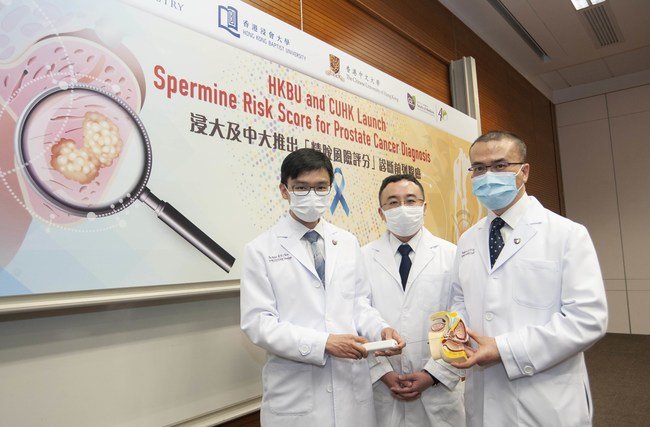
Source: prnewswire.com
Researchers from Hong Kong Baptist University (HKBU) and the Faculty of Medicine at The Chinese University of Hong Kong (CU Medicine) have jointly developed the Spermine Risk Score which, coupled with the use of a urine test, provides a non-invasive and more reliable method for the diagnosis of prostate cancer. The findings have just been published in the scientific journal Prostate Cancer and Prostatic Diseases.
In search of a more reliable and non-invasive method for prostate cancer diagnosis, Professor Gary Wong Ka-leung, Professor and Head, Department of Chemistry, HKBU, and Professor Ng Chi-fai and Dr Peter Chiu Ka-fung, Professor and Associate Professor respectively of the Division of Urology , Department of Surgery, CU Medicine, have collaborated since 2014 to identify a new biomarker to supplement the PSA test.
Among the 905 patients recruited between 2015 and 2019 to participate in a study, 600 of them who had PSA levels ranging from 4 to 20 ng/mL were included in the analysis. Their urine samples were collected before they underwent a biopsy procedure. The biopsy results showed that out of the 600 patients, 185 (30.8 per cent) were diagnosed with prostate cancer.
At the same time, the urine samples of these 600 patients were also analysed. The results found that about 49 per cent of the patients with spermine levels in the lowest quartile had prostate cancer, which was nearly triple the number of patients in the highest quartile (17 per cent).
Dr Chiu concluded the findings by highlighting that, "This study confirms that urine spermine and the Spermine Risk Score are effective at identifying men at higher risk of prostate cancer and the test could help reduce the number of unnecessary biopsies.”
"It successfully demonstrated that the Spermine Risk Score, developed based on patients' urine spermine levels and other clinical parameters, can serve as a novel and promising approach to address the limitations of the diagnostic methods currently in use," said Professor Wong.
"Although there are a number of blood and urine adjuncts to guide prostate biopsy decisions in patients with elevated PSA levels, urine spermine is a convenient non-invasive test that doesn't require another blood test or attentive DRE before specimen collection. Thus it minimises any potential complications associated with the procedures," said Professor Ng.




